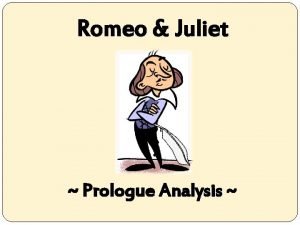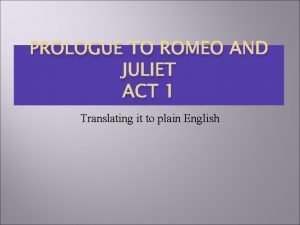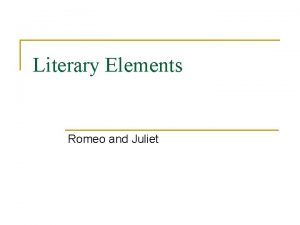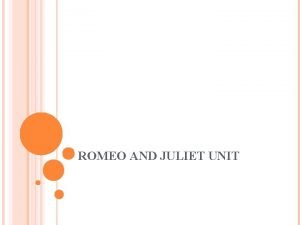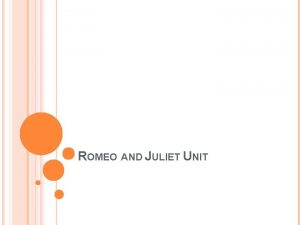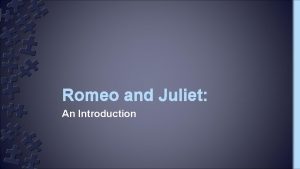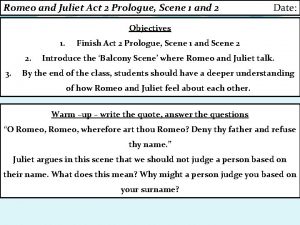Romeo and Juliet Prologue and Scene 1 Date








- Slides: 8

Romeo and Juliet Prologue and Scene 1 Date: Objectives Read the Prologue and half of Act 1 to introduce the play. • • By the end of this class, students should have a better understanding of the world the play takes place in. Warm –up – Write down the quotes and answer the question *“death-marked love”, *“A pair of star-crossed lovers” Shakespeare gives away the ending at the start of the play. Romeo and Juliet will die* and because it is fate * nothing can be done. Our warm-up question is therefore this:

Today’s Reading 1. Act 1 Prologue and Scene 1 • Prologue is one minute in the Audio Book. It introduces the play and discusses the FATE of Romeo and Juliet. • Act 1 Scene 1 • 1. 00 – 3. 30 Introduces Capulet servants who ‘bite their thumb’ at Montagues. • 3. 30 – 5. 00 Introduces Benvolio and Tybalt, then Capulets and Montagues fight • 5. 00 – 6. 30 The Prince enters and ends the fight. • Audiobook at https: //www. youtube. com/watch? v=AYDFQL_Lfe. Y

Notes - Prologue • Prologue: Introduction. • Setting: Verona, Italy. • Characters: Montagues and Capulets. • Conflict: The two families have been fighting for generations. This feud will result in the death of their children; Romeo and Juliet, which will bring about peace between the families. • Theme: Fate. It is their destiny to meet, fall in love and die. • The play is a tragedy; in which good characters make mistakes leading to an unhappy ending. We are now asked to

Notes – Act 1 Scene 1 (part 1) • Violence, hatred and the feud between the families are major themes. Nobody remembers what started the feud but they are willing to kill each other because of it. • The Capulet servants want to provoke the Montague servants so bite their thumbs at them (insult). • Benvolio (name means good-will or peacemaker); a Montague, tries to break up the fight. • Tybalt (name means prince of cats); a Capulet, attacks Benvolio and announces his hatred of peace. • The heads of the families (old men) want to take part and are mocked by their wives. • The Prince arrives and issues a death threat to anyone who fights again.

Exercises • Face someone next to you and ‘bite your thumb’ at them. Explain what this looks like then. Does the person doing it look more aggressive? Does it look rude? How is it an insult in your opinion?

Exercises • Standing debate: Push chairs in. Vote for which side you support (Montague or Capulet) by standing on one side of the room or the other. • For Montagues (Benvolio) go right. • For Capulets (Tybalt) go left. • Be prepared to explain why you choose that side. (Look at the notes on the previous slides if you are stuck on picking a side. Your reason can be anything as long as you can argue it. )

Questions – Point, “reference”, explain. 1. What are your impressions of the Montagues? (Benvolio, Lord Montague, Abram) 2. What are your impressions of the Capulets? (Tybalt, Lord Capulet, Sampson, Gregory, Lady C. ) 3. What is your impression of Prince Escalus? 4. If you were directing the play, how would you help people know who was a Montague and who was a Capulet?

Cooldown Question People naturally split into groups. They then think their group is great and they ‘demonise’ another group. What do you think the word ‘demonise’ means? Give examples.



